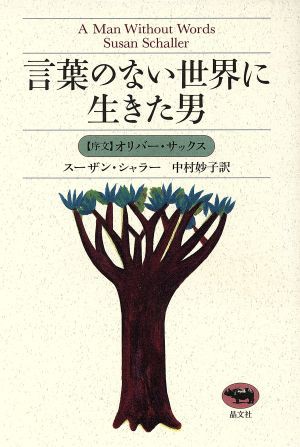異邦人
突然、言葉がわからない国(世界)に迷い込んだら、どうなるでしょう。言葉が通じないだけで、孤独になり、絶望するかもしれないです。ゼスチャーで必死に「意思」を伝えようとするでしょう。
逆に、あなたがそんな私を見ているその国の人だったら?身振り手振りをしながら、変な声を発する私のことを、きっと怖がるのではないでしょうか。多くの人が、私を怖がる中で、「優しさ」から、勇気を持って私に近づく人もいるかもしれません。著者はそんな人間の一人なように思います。そこには興味の対象として、「怖いもの見たさ」や「知りたい」という感情もあったでしょう。
著者が「商業主義」かどうか、この本が「ノンフィクション(実際あったこと)」かどうかもわかりません。でも、そんなことは問題ではないのです。著者(あるいは主人公)のような人がいる(可能性がある)ということだけでも、嬉しくなります。
手話
イルデフォンソは27歳の男性。聾者で、言葉というものを知らずに生きてきました。著者は、イルデフォンソに手話を教えます。と言うか、手話で彼を知りたいと思います。
その手話は「アメスラン」(アメリカ手話 ASL = American Sign Language )です。手指英語(Signed English)は英語の音を視覚的に表したもので、英語の文法に則っていますが、アメスランは独自の文法を持っている英語とは違う「一つの言語」です。日本でアメスランにあたるのが、「日本手話(伝統的手話)」、手指英語に相当するのが「手指日本語(同時法的手話)」だそうです。前者を覚える(勉強する)ということは一つの外国語を覚えるということだと思います。
外国語が苦手な私には無理ですね。
外国語
外国語に対する私のコンプレックスはとても強く、今まで何度も何種類もの言葉を勉強しようとしました。ビートルズが好きだったので英語を、韓国ドラマにハマった時は韓国語を、ギリシア哲学に興味を持ったときには古典ギリシア語を、サンスクリット、中国語、アイヌ語・・・。英語はアルファベットがわかります。アイヌ語には文字はありません。中国語は漢字ですが、日本で使われている漢字とは字体が違うし、意味も同じではないようです。サンスクリットは一切読めません。ギリシア語は文字がアルファベットと異なるので、うまく読めません。英語以外はどれも「三日坊主」です(英語は仕方なく学校で勉強しましたが)。発音がわからない(つまり読めない)言語はとっつきにくいですよね。
失敗すると、コンプレックスはますます強くなります(笑)。もう、バイリンガルになるのは諦めました。くやしいけど、仕方ないです(今でも、高校時代のある英語教師を恨んでいますが)。
その挫折の繰り返しの中で、いくつかわかったことがあります。その一つは、言葉が違えば、考え方(思考)が違うということです。懲りずに数日前に中国語の入門書を読んでいましたが、日本語との違いを見て「へえ、中国人ってこんなふうに考えてるんだ」って思いました。
考え(思考)が言語を決めるのか、言語が考えを決めるのかわかりません。相互作用があるのは確かですが、もし人間が「白紙」で生まれてくるのだとすれば、言語が思考を規定するのでしょう。思考や文化は、社会そのものですし、その社会は、それがある地域の風土と密接に関係していると思います。
単語、動作、時間
イルデフォンソは名詞と動詞の違いを知るのに苦労したようですが、名詞と動詞が分かれているのはSAE(平均的ヨーロッパ標準語、英語とか、フランス語とかのこと。)に独特なものです。アイヌ語には形容詞あたるものがないそうです。SAEで言う形容詞は動詞的なもののようで、「美しい」は「美しくなる」「美しくある」という感じです。固定した客観性と言うよりも、動的な過程として捉えるのでしょう。日本語でも名詞に「る」を付けて動詞にするのが流行っていますよね。でも、別にこれは最近のことではなくて、むかしから日本語がもっている特徴です(漢文読み下しから始まったのでしょうか)。
動かないものには名前をつけやすいですが、動きそのものに名前をつけるのは難しい気がします。「歩く」と「走る」の違いはきっと「walk」「run」の違いとは違うでしょう。その違いは「イヌ」「ネコ」と「dog」「cat」の違いより大きいような気がしますが、「牛」と「ax、cow、bull」の違いよりは小さいでしょうか。わかりません。
形容詞でも同じです。「hotとcold」の違いは「暑い(熱い)、寒い(冷たい)」の違いと違います。日本語では「水」は冷たいものですが、SAEでは冷たいというイメージはないようです。
イルデフォンソが著者と最後に会ったときまで理解できていなかったかもしれないのが、時間の概念です。これもSAEに特徴的なものです。SAEでは時間を空間的に把握します。時間を眼の前にあるものと同じように、測ったり、分割したり出来ると考えます。時間軸という一つの次元と考えます。ミンコフスキー空間はその数学的表現ですよね。日本語でも、時間を「遠い・近い」とか「長い・短い」とか空間的に捉える傾向があります。でも、SAEとはちょっと違うような気がするのは輪廻的な発想から来ているのでしょうか。
英語には、過去形とか、完了形とかがあります。日本語にもあることになっていますが、それはSAEから見たものです。「ここにあった」という日本語は「Here it was」ではありません。「(なんだ〜)ここにあった」なら、「Here it is」です。日本語で「あった」と言うのは、たぶん、自分の存在を過去に位置づけてその自分との関連付けての発言のような気がします。英語の動詞には未来形がありません。なぜでしょう。著者は1年が12ヶ月に、1ヶ月が30日、あるいは4週間に、1日が24時間に分けられることを当然と考えているようですが、それはけっして当り前のことじゃないし、言語と同質なものでもありません。考え方の違いです。
数字
イルデフォンソは著者が言葉を教える前から、数の概念をもっていました。イルデフォンソの友達にも計算の達者な人がいます。文字と数字は全くの別物かもしれません。「1,2,3」は「いち、にい、さん」と読んでも「one、two、three」と読んでも変わりありませんよね。少なくとも表音文字ではないのです。数に名前をつけるのと、モノに名前をつけるのでは違うのです。
文字は商業から始まったと言われます。私もそう思っていました。でも、それは(カッコ)つきのものだと思いました。数字は「パズル」に近いものかもしれません。数字は文字より「印(しるし)」に近いものでしょう。
ただ、数(字)もある程度を超えると、文字(あるいは概念)になります。漢字では「十」「百」「千」「万」「億」とかの単位がありますし、SAEでも「ダス」「セント」「キロ」「メガ」等の単位があります。それらは日常(具体性)をどんどん超えていきます。日常では手足の指という「天然の計算機」を超える数は殆ど使われません。たとえば、「けさご飯を500粒食べた」とは言いません。「一膳」とか「茶碗一杯」です。一年間に食べる米の量は、粒でも杯でもなくて、一俵とか言うのです。
教える、学ぶ
著者が、常に気にしていることは「教える」ことの倫理性です。「教育は生徒に、おまえはおまえを教えている教師のようにならなければいけないというメッセージを伝える可能性がある。それは生徒が、あるいは彼の考え方が、教師に劣っているということを意味するのである」(P.224)。人が人の「内的世界」に干渉することの是非です。それも西洋思想の中で「人権」として論議されてきたことです。
「啓蒙」ですね。大航海時代以降、あるいは古典ギリシアのバルバロイから始まる言葉の違いによる差別構造でもあります。私はそこに「自我」を絶対視する文化と、力を背景とした「文字の文化」の存在を見ます。
(メアリ・ダグラスは)「指摘する、「動物を馴らすということは、生理的プロセスのコントロールを意味する。子どもの社会化も同じことを意味するのである。」動物に似た野生児は、わたしたちが人間性についていだいている神聖な観念への挑戦である。というわけで、野生児を捕らえたものは彼らを「より人間らしく」するために、しばしば非道な扱いをしたのであった。」(P.228)「長いこと無秩序と混沌ばかりを経験したあげく、自分のまわりの世界の一部を組織化し、コントロールできるようになったことは、たいへんな力の実感を当人に与えたに違いない」(P.246)。これは、コントロールの対象としての客体の発見で、コントロールする主体の形成です。自我以外を全て客体として見てしまうと、別の自我、つまり他者をも客体として、コントロールの対象として見てしまうということになります。でも、〈他者〉も〈自我〉に違いありません。それを侵すことは自分自身を侵すことで、〈自我〉はそれに耐えられません。それが「人権」という「言い訳、赦し」です。それを突き破るためにはその対象を「非人間化」、あるいは「劣っているもの」「発達途上のもの」にしなければなりません。「教える、育てる」ということには常にその可能性がつきまといます。それは暴力の発生の可能性でもあります。
著者は「先生と生徒」という関係をやめます。でも、どれだけ慎重になっても著者には「かわいそう、助けてあげたい」という気持ちがあると思います。慈悲や援助はやはり「おごり」あるいは「優越感」なのではないでしょうか。
私は「ヘレン・ケラー物語」的な感動よりもこの著者の苦悩こそが大切だと思います。
翻訳
言語は世界観です。外国語を学ぶということは「別の」「新しい」世界観、考え方、思想、を知るということです。別の世界観を知ることで、自分の世界観がわかります(「彼の世界をつぶさに理解することによって、わたし自身の世界についても説明できるのではないかと考えたからだった。」P.154)。そのとき、〈自我〉があると「自分の世界観」に引きつけて「他の世界観」を「解釈」してしまいます。それでは、せっかく知る世界観が「別の」「新しい」ものではなくなってしまうし、結果として「自分」を知ることもできません。どこまでいっても、他者は〈自我〉の延長でしかなくなります。〈自我〉は拡大する(肥大する)だけで、それを理解することはできません。
「Here it is」「Water, please」をなるべく正確に日本語に訳すことは大切です。でも、それには限界があります。それは、私が言った「ありがとう」を、同じ日本語であなたが、他の人に伝える難しさと同じものです。それは、わたしが感じている感謝の気持を「言葉で」表す難しさでもあります。
不可能だとは思いません。「誰もみんな孤独だ」「理解し合えるなんてことはありえない」とニヒリスティクに諦めるのも違うと思います。少なくとも、世界はそれで成り立っているのですから。
Gentiles
What if you suddenly get lost in a country (world) where you don't understand the language? You may be lonely and desperate just because you don't understand the language. You will desperately try to convey your "will" with gestures.
On the contrary, what if you were a person from that country looking at me like that? I'm sure you're scared of me making strange voices while gesturing. While many people are afraid of me, some may approach me with courage because of their "kindness." I think the author is one of those people. There may have been feelings of "I saw something scary" or "I want to know" as an object of interest.
I don't know if the author is "commercialism" or if this book is "non-fiction". But that doesn't matter. It makes me happy just because there is (possibly) someone like the author (or the protagonist).
Sign language
Ildefonsus is a 27-year-old man. He is deaf and he has lived without knowing words. The author teaches sign language to Ildefonsus. Or rather, I would like to know him in sign language.
The sign language is "Ameslan" (American Sign Language). Signed English is a visual representation of the sounds of English and follows the grammar of English, but Ameslan is a "one language" that is different from English, which has its own grammar. It is said that "Japanese Sign Language (traditional sign language)" corresponds to Ameslan in Japan, and "Signed Japanese (simultaneous legal sign language)" corresponds to finger English. I think that learning (studying) the former means learning one foreign language.
It's impossible for me, who is not good at foreign languages.
Foreign language
My complex with foreign languages is so strong that I have tried many different languages over and over again. I liked the Beatles, so I used English, when I was addicted to Korean dramas, I used Korean, when I was interested in Greek philosophy, I used classical Greek, Sanskrit, Chinese, Ainu ... I understand the alphabet in English. There are no letters in Ainu. Chinese is a Chinese character, but it has a different font and meaning from the Chinese characters used in Japan. I can't read Sanskrit at all. Greek letters are different from the alphabet, so I can't read them well. All but English are "Mikabozu" (although I had no choice but to study English at school). Languages that you don't understand (that is, can't read) are hard to come by.
If you fail, the complex will become stronger and stronger (laughs). I have given up on being bilingual. It's annoying, but it can't be helped (although I still have a grudge against an English teacher in high school).
In the course of that setback, I learned a few things. One of them is that different words have different ways of thinking. I was reading an introductory book in Chinese a few days ago without discipline, but when I saw the difference from Japanese, I thought, "Hey, Chinese people think this way."
I don't know if the thought (thinking) decides the language or the language decides the thought. Certainly there is interaction, but if humans are born "blank", language will define their thinking. Thoughts and culture are the society itself, and I think that society is closely related to the climate of the region in which it is located.
Words, actions, time
Ildefonsus seems to have had a hard time figuring out the difference between nouns and verbs, but the separation of nouns and verbs is unique to SAE (Average European Standard). It seems that there is no adjective in Ainu language. The adjectives in SAE seem to be verb-like, and "beautiful" means "become beautiful" and "be beautiful." Perhaps it is a dynamic process rather than a fixed objectivity. Even in Japanese, it is popular to add "ru" to a noun to make it a verb. However, this is not a recent thing, and it is a feature that Japanese has had for a long time (Is it started by reading the Chinese text?).
It's easy to name things that don't move, but I find it difficult to name the movement itself. The difference between "walking" and "running" is probably different from the difference between "walking" and "run". I think the difference is larger than the difference between "dog", "cat" and "dog", and "cat", but is it smaller than the difference between "cow" and "ax, cow, bull"? do not understand.
The same is true for
adjectives. The difference between "hot and cold" is different from the difference between "hot (hot) and cold (cold)". In Japanese, "water" is cold, but SAE doesn't seem to think it's cold.
What Ildefonsus may not have understood until the last time he met the author is the concept of time. This is also characteristic of SAE. SAE keeps track of time spatially. I think you can measure and divide time as if it were in front of you. Think of it as one dimension, the time axis. Minkowski space is that mathematical expression, isn't it? Even in Japanese, there is a tendency to perceive time spatially as "far" or "close". But is it because of the revolving idea that I feel that it is a little different from SAE?
In English, there are past tense and perfect tense. It is supposed to be in Japanese, but it is from SAE's point of view. The Japanese word "here it was" is not "Here it was". If "(what) was here", then "Here it is". When I say "was" in Japanese, I think it's probably a statement that positions my existence in the past and associates it with me. English verbs have no future tense. I wonder why. The author seems to take it for granted that a year is divided into 12 months, a month into 30 days, or 4 weeks, and a day into 24 hours, but that's not the norm, and it's the same quality as the language. It's not something like that. It's a different way of thinking.
numbers
Ildefonsus had the concept of numbers even before the author taught the language. Some of Ildefonsus' friends are also math-savvy. Letters and numbers may be completely different. It doesn't matter if you read "1, 2, 3" as "Ichi, Nii, San" or "one, two, three". At least it's not a phonetic character. Naming numbers is not the same as naming things.
The letters are said to have started in commerce. I thought so too. But I thought it was with (parentheses). The numbers may be close to a "puzzle". Numbers are more like "marks" than letters.
However, when the number (character) exceeds a certain level, it becomes a character (or concept). In Chinese characters, there are units such as "10", "hundreds", "thousands", "10,000", and "100 million", and in SAE, there are units such as "das", "cents", "kilo", and "mega". They go beyond everyday life (concreteness). In everyday life, the number of fingers and toes, which exceeds the number of "natural calculators", is rarely used. For example, I wouldn't say "I ate 500 grains of kesa rice." "Ichizen" or "a bowl of tea". The amount of rice we eat in a year is not a grain or a cup, but a bale.
Teach, learn
What the author always cares about is the ethics of "teaching." "Education can convey to students the message that you must be like the teacher who teaches you, which means that the student, or his way of thinking, is inferior to the teacher. "(P.224). The pros and cons of a person interfering with a person's "inner world." That is also what has been discussed as "human rights" in Western thought.
It's "enlightenment". It is also a discriminatory structure due to differences in language that began after the Age of Discovery or from the classical Greek Barbaroi. I see the existence of a culture that absolutely views the "ego" and a "culture of letters" against the background of power.
(Mary Douglas) points out, "Acclimatizing animals means controlling physiological processes. Socialization of children means the same." It is a challenge to the sacred notion that we have about humanity. So those who captured wild children often treated them outrageously in order to make them "more human." (P.228) "After experiencing disorder and chaos for a long time, being able to organize and control a part of the world around me gave the person a great sense of power. Must be "(P.246). This is the discovery of an object as an object of control, and the formation of a controlling subject. If you look at everything other than the ego as an object, you also see another ego, that is, another person as an object and an object of control. But that must also be an "ego". To invade it is to invade oneself, and the ego cannot tolerate it. That is the "excuse, forgiveness" of "human rights." In order to break through it, the object must be "dehumanized", or "inferior" or "developing". "Teaching and nurturing" always has that potential. It is also the possibility of violence.
The author ceases the "teacher-student" relationship. However, no matter how careful I am, I think the author has a feeling of "poor, I want to help." Isn't mercy and assistance still a "treasure" or a "superiority complex"?
I think the anguish of this author is more important than the impression of the "Helen Keller story".
Translation
Language is a world view. Learning a foreign language means knowing a "different" and "new" worldview, way of thinking, and thought. By knowing another worldview, I can understand my own worldview ("I thought that I could explain my own world by understanding his world in detail." P.154) .. At that time, if there is an "ego", it will attract you to your "view of your world" and "interpret" your "view of another world". Then, the world view that you know will not be "another" or "new", and as a result, you will not be able to know "yourself." No matter how far you go, others are nothing more than an extension of the Ego. The "ego" only expands (blows) and cannot be understood.
It is important to translate "Here it is" and "Water, please" into Japanese as accurately as possible. But there are limits to that. It is the same difficulty that you can convey the "thank you" I said to others in the same Japanese. It is also the difficulty of "verbally" expressing the feeling of gratitude that I feel.
I don't think it's impossible. I think it's different to give up to Nihilistic, saying, "Everyone is lonely" and "It's impossible to understand each other." At least, the world is made up of it.
〈書抜〉
「彼の世界をつぶさに理解することによって、わたし自身の世界についても説明できるのではないかと考えたからだった。」(P.154)
(イシ・・・北米最後の野生のインディアン・ヤヒ族の最後の男)「イシを原始的だとか、野蛮だとか、考える人がいるかもしれない。しかし極端な偏見を持つ者でも、彼を非人間的だとは考えないだろう。一方、古来多くの人が言葉を欠いている人たちを人間の枠の外にいると見なしてきた。古代のギリシア人はギリシア人以外の人間をバルバロイと呼んだ。バーバリアンーー野蛮人ーーはこの語から派生したのである。彼らの耳に外国語が、まるでナンセンスと聞こえたからだった。しかしギリシア人はパルバロイを人間と見ていたばかりではなく、ギリシア人によって文明化しうる人々、ギリシア的教養を身につけることができる人々と認めていた。hellenisthenai ten glossan とは文字どおりに訳すと、ギリシア人の舌を通じてギリシア化されるという意味になるだろうか。古代人はイルデフォンソがわたしに教えてくれたようなことを、身をもって感じとっていた。言語は人類を規定しない。それは部族を規定するのである。」(P.156)__蝦夷、南蛮
「イシの言葉も文化も原始人の世界に属するものであったが、彼は地域社会の一員として暮らした経験をもっていた。何年間も他の人間と接触しなかったにもかかわらず、彼には自分の部族の道具があり、その精神的支えを頼みとしていた。彼のうちには、それまでの生涯に出会ったあらゆる人々の記憶が残っていた。彼らが口にした言葉、彼らが伝えてくれた情報、また助言が彼の思考や知恵の肥やしとなっていた。言語はある意味で人に不死の力を賦与する。イシの部族は死に絶えた後にも彼を助けて、生きつづけること、人生を解釈することを彼にとって可能にしてくれた。イルデフォンソと違って、イシには一連の信念、思考、憶測があって、まわりの未知の世界からあたらしい情報を引き出すにあたって、それらに頼ることができた。類推し、比較すること、彼の言語が提供してくれるすべての象徴と概念を操作することができた。」(P.158)
「イシには、ルリアの言う内的世界があった。」(P.159)
「この野生人はイシという名で知られるようになった。それはヤナ語でたんに「人」を意味する語である。イシは自分の実名を、けっして明かさなかった。」(P.161)__アイヌ。人間は体で話す。文字や新型コロナで失った具体性。
「教育は生徒に、おまえはおまえを教えている教師のようにならなければいけないというメッセージを伝える可能性がある。それは生徒が、あるいは彼の考え方が、教師に劣っているということを意味するのである。」(P.224)__子供に対して、障害者に対して、老人に対して、そのような態度を取る人のなんと多いことか。
「しかしわたしたちは魅力と同時に、反発をも感ずる。自由はうらやましいが、野生は恐ろしい。人間の中にひそむ動物的な性格は、わたしたちを恐れさせる。どの文化も、人間性のある面を否定するか、隠蔽することに多くの努力を費やしてきた。人類学者メアリ・ダグラスは自然と文明を分ける方法を純粋原則と呼んでいる。社会的習慣、コミュニケーション、言語の使用は、この規則を通じて決定され、行われるのである。」(P.227)
(メアリ・ダグラス)「彼女は指摘する、「動物を馴らすということは、生理的プロセスのコントロールを意味する。子どもの社会化も同じことを意味するのである。」動物に似た野生児は、わたしたちが人間性についていだいている神聖な観念への挑戦である。というわけで、野生児を捕らえたものは彼らを「より人間らしく」するために、しばしば非道な扱いをしたのであった。(LF)聾者も聴者の世界からの同じような反応に遭遇する。人々は彼らの発する動物的な音声に反発を感ずる。両親ですらしばしば、自分の子どもが話せないということを知恵遅れとみなす。」(P.228)
「孤独な人間は、本当の意味で人間であるとはいえない。」(P.229)__わたしは人間ではなかった。いや、孤独を感じる人間、すなわち物心ついたあとの殆どの人間は、人間じゃないのかもしれない。
「わたしたちは言語が人格の形成、徳性の発達、精神的健康、また知性の発達にとってきわめて大きな役割をつとめていると信じている。しかしイルデフォンソと野生児たちとの相違は、人間としての属性をわたしたちに与えているものは何かということを再検討するようにわたしたちに挑戦しているのである。」(P.230)
「長いこと無秩序と混沌ばかりを経験したあげく、自分のまわりの世界の一部を組織化し、コントロールできるようになったことは、たいへんな力の実感を当人に与えたに違いない。」(P.246)__客体と主体の形成。コントロール。暴力の発生。
「彼があらゆる点で順応してしまったわけではないことを知って、わたしはうれしかった。」(P.253)
「故郷の村を離れ、教育を受けず、それを奨励されることもなかったこれらの人々は、意識的存在としての出発以前の過去をもたなかったが、お互い同士を見出し、個々の、また集団としての歴史を形成しはじめた。彼らはいわば初代の人間として、ちょうどわたしたちの祖先がしたに違いないように、自分たち自身の文化と言語を創造しているのであった。」(P.274)



